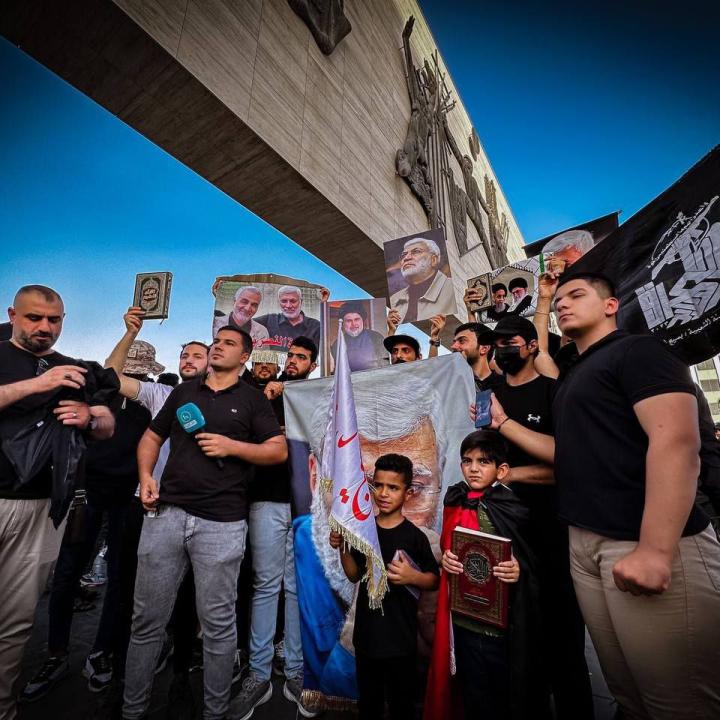
Nujaba Claims Victimization by Coordination Framework Militia-Politicians

Tensions between Iraq's "resistance" groups are on the rise, with Harakat Hezbollah al-Nujaba claiming that its online platforms and street protests are being targeted.
On August 13, Ashab al-Kahf (AK), a facade group run by the Iraqi militia Harakat Hezbollah al-Nujaba (HaN), issued a strongly worded statement accusing other Iran-backed muqawama (resistance) elements of conspiring with their worst enemies to arrest HaN members. The statement reads: “The public of the Islamic Resistance must know about the injustice and assault on their sons and brothers in their Islamic resistance, Ashab al-Kahf. On 2023/3/22, a joint Iraqi force made up of corrupt people affiliated with the Hashd [aka the Popular Mobilization Forces or PMF], members of a particular fasail [armed faction], a force from al-wikalat al-Istikhbarat [the Interior Ministry's intelligence branch], officers from al-maktab al-khas fi Jahaz al-Mukhabarat [Iraqi National Intelligence Service], and a limited number of the CIA arrested a few of the best mujahedin and motakhassesin (specialists) working exclusively against the Israeli presence [in Iraq]” (Figure 1). The statement's rambling accusations also implicate “NATO intelligence” and "extremist Jews."
AK is referring to a raid that occurred on March 22 in Basra, where the PMF Investigations and Preventive Security department (part of the PMF General Directorate of Security and Discipline) arrested various AK members. Because this Basra department is run by a member of the militia Asaib Ahl al-Haq (AAH), AK appears to be accusing AAH of colluding with the enemies of the muqawama.
This incident also indicates that AK (and, more broadly, HaN) are under mounting pressure. AK’s online presence may have been specifically targeted by the Sudani government and its Communications and Media Commission under the cover of a recent blanket Telegram ban, which was later lifted but with AK’s channels still removed. AK opened a new channel but has been forced to rebuild its painstakingly developed following, which had reached nearly ten thousand subscribers before the ban and is now around two-thirds that level. AAH and Kataib Hezbollah (KH) have moved to dominate reshuffles at Iraq’s intelligence agencies this summer and may see AK, which has an intelligence function for HaN, as a rival. AK’s August 13 statement seems intended to portray KH and AAH’s intelligence gains as the product of compromises made with foreign enemies (i.e., the United States, Israel, NATO).
The AK statement also complains that the group's efforts to protest at the U.S. embassy on July 14 were stymied by “those who submit to America and [those] who flatter them and sit with them.” Logically, these accusations can only refer to Coordination Framework members such as Nouri al-Maliki, the Badr Organization’s Hadi al-Ameri, and Ammar al-Hakim. AK even accuses forces affiliated with these figures of “kidnapping” the “rebellious youth” from gatherings at the U.S. embassy and Karbala during the muharram mourning season. Both of these gatherings were called by the Iraqi Basij, a newly established street mobilization movement set up by AK/HaN.
At the time, the Iraqi Basij accused “the governor of Karbala and those who claim to be [part of] the muqawama” of destroying their mawkeb [a structure usually erected for mourning] (Figure 2). In all likelihood, AK crossed a line by trying to arrange street actions in Karbala, which the muqawama have recently treated as a neutral zone where no militia is permitted to dominate local affairs or organize unilateral protests (the shrine city of Najaf is accorded the same status). This could explain comments made in early July by Abu Ali al-Askari, KH’s head of security, who chided factions to “keep the holy province of Karbala outside the political competition and partisan tension” and warned against “compromising the ideal situation in Karbala” (Figure 3).
Signs of real tension between HaN (including its offshoots AK and the Iraqi Basij) and other muqawama and Coordination Framework actors require ongoing, detailed monitoring. New efforts by the Iraqi Basij to hold protests or other events in the two main shrine cities would indicate continued defiance; the same message might be conveyed if AK aggressively regrows its Telegram channel (probably via paid bots). It will also be interesting to see whether AK and the Iraqi Basij try to damage AAH electoral campaigns in the leadup to this December's provincial elections.








